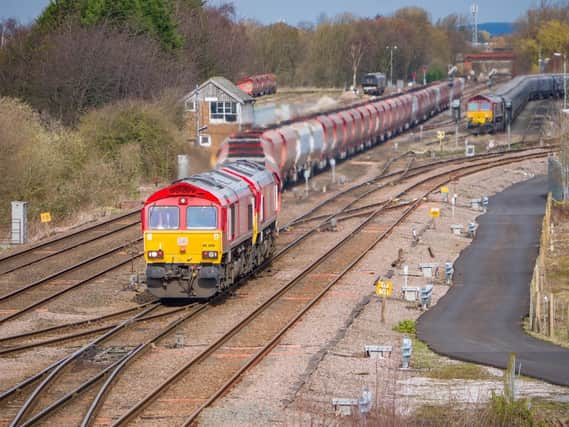Some trains are travelling through Yorkshire at just 16mph due to overcapacity


Revisiting High Speed North's authors found that with inter-city passenger and commuter trains given priority for space on congested lines, freight trains travelling to and from Drax power station in North Yorkshire and Immingham docks on the Humber are forced to make stop-start journeys to allow faster services to pass.
The issue is particularly acute on trans-Pennine routes between Hull, Leeds, Manchester and Liverpool.
Advertisement
Hide AdAdvertisement
Hide AdThe report highlights how the situation could deteriorate further before the completion of High Speed Rail projects in 20 years. A faster east-west link called Northern Powerhouse Rail has been proposed.
Transport consultant Jim Steer and co-authors Ian Wray, from Liverpool University, and David Thrower believe long-distance, commuter and freight traffic is forced to compete for 'too little space on the tracks', with some goods trains reduced to averaging speeds of 5-15mph.
Network Rail has already made significant investments in the bottleneck east-west corridor, including upgrading the Transpennine line between Manchester, Leeds and York and building platform extensions at 70 stations to accommodate longer trains.
HS2's extensions to Manchester and Leeds are not expected to be finished before 2040 and no target date has been given for the building of Northern Powerhouse Rail.
Advertisement
Hide AdAdvertisement
Hide AdThe report's recommendations include a 'super-hub' in Manchester with a tunnel from the west into Piccadilly Station that can be used by faster trains from Wales, Liverpool and Glasgow that are heading to Yorkshire.
“The network does not work, crucially through Manchester, but also in Liverpool, Leeds and Sheffield, where stations and lines are at capacity, or in Manchester’s case overcapacity. Average journey times for Transpennine freight are as low as 16mph and 17mph. These issues cannot wait for a solution until the 2040s.”
The 16mph average speed has been recorded for freight trains travelling from Liverpool to Drax power station, with 17mph for journeys from Immingham to Eggborough power station and 19mph from Immingham to Drax.
Around 90 trains a week deliver biomass to Drax, as the plant near Selby generates five per cent of the UK's electricity. Engineers worked 24-hour shifts in February, when the River Aire flooded the two lines into the power station in the aftermath of Storms Ciara and Dennis. They were able to keep one line open to rail traffic and production at the site was unaffected.
Advertisement
Hide AdAdvertisement
Hide AdOver 400,000 tonnes of freight are transported through Yorkshire every week, including supermarket products, materials for the steel plants at Scunthorpe, household waste for disposal, petroleum fuel and raw materials.